Economic Growth and Sustainable Development: Sri Lanka & Canada Essay
VerifiedAdded on 2023/03/21
|12
|727
|74
Essay
AI Summary
This essay analyzes economic growth and sustainable development by comparing Sri Lanka and Canada. It begins with a theoretical overview, discussing the Solow and Malthusian models, capital accumulation, and the impact of population, health, education, technology, and governance on economic growth. The essay then applies these theoretical insights to the two countries, using relevant data to describe developments in key variables and understand the differences in economic growth. Finally, based on the findings, the essay makes policy recommendations for Sri Lanka, focusing on investments in education and health, controlling population growth, and fostering economic growth.
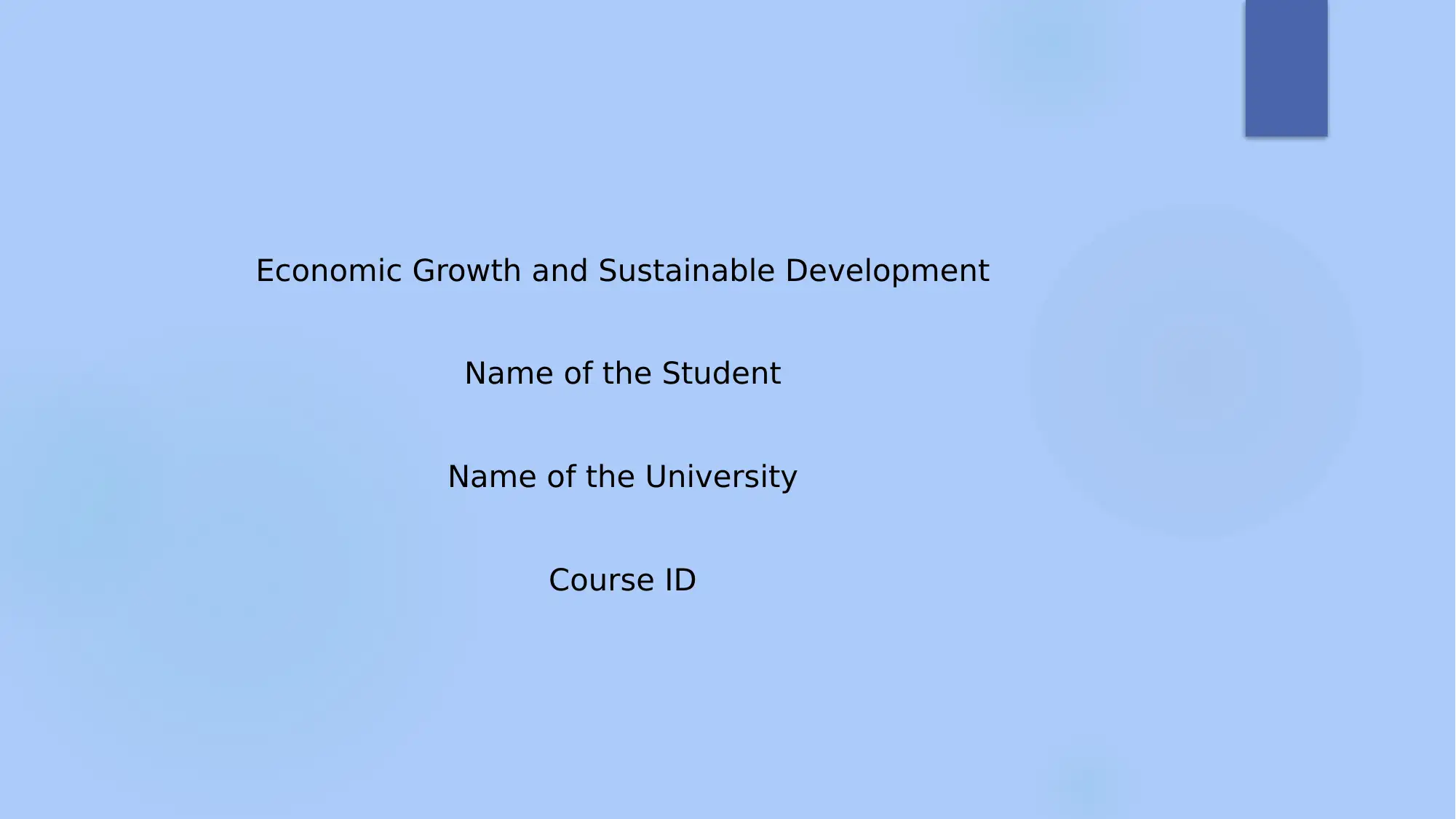
Economic Growth and Sustainable Development
Name of the Student
Name of the University
Course ID
Name of the Student
Name of the University
Course ID
Paraphrase This Document
Need a fresh take? Get an instant paraphrase of this document with our AI Paraphraser
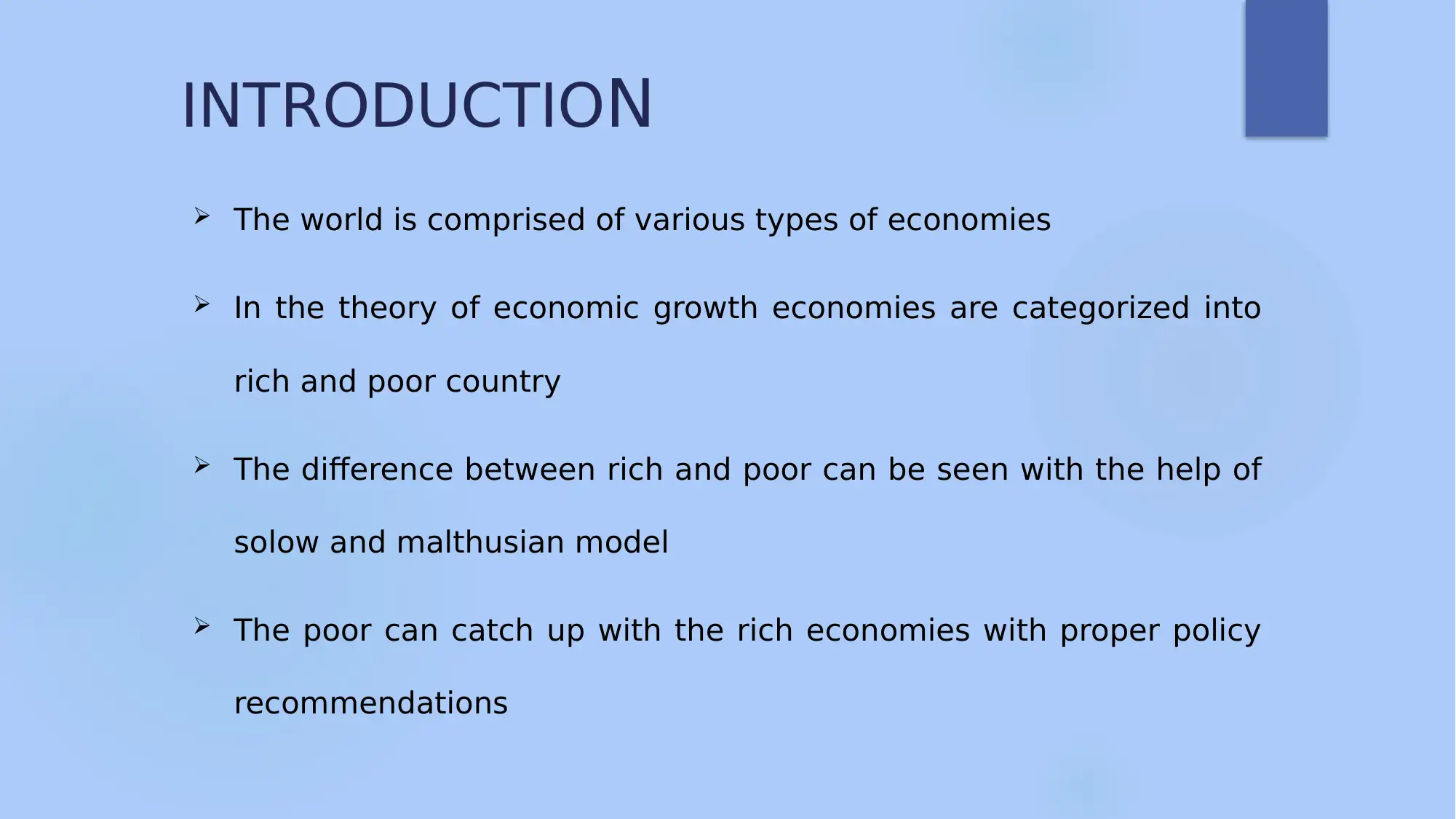
INTRODUCTION
The world is comprised of various types of economies
In the theory of economic growth economies are categorized into
rich and poor country
The difference between rich and poor can be seen with the help of
solow and malthusian model
The poor can catch up with the rich economies with proper policy
recommendations
The world is comprised of various types of economies
In the theory of economic growth economies are categorized into
rich and poor country
The difference between rich and poor can be seen with the help of
solow and malthusian model
The poor can catch up with the rich economies with proper policy
recommendations
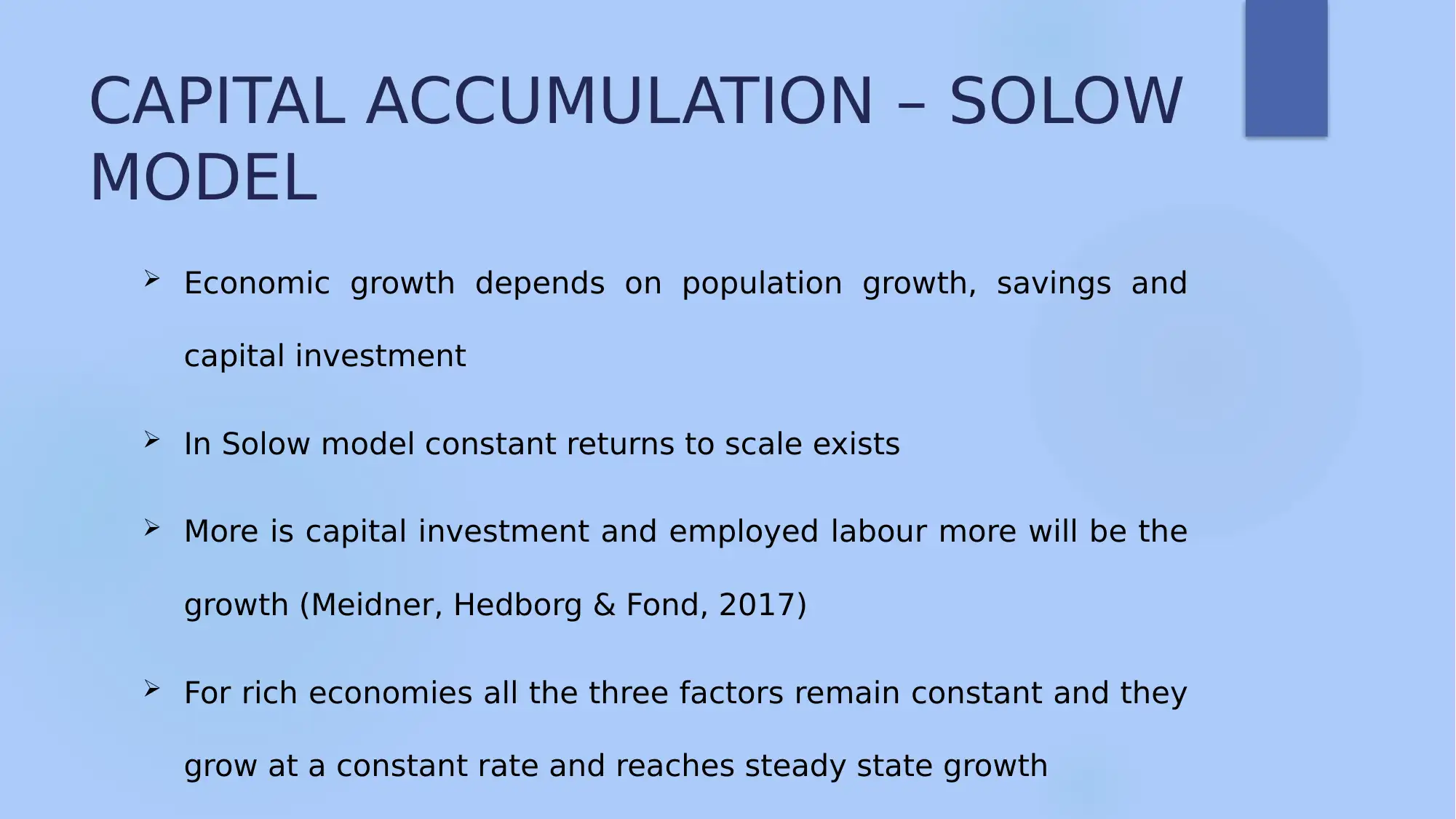
CAPITAL ACCUMULATION – SOLOW
MODEL
Economic growth depends on population growth, savings and
capital investment
In Solow model constant returns to scale exists
More is capital investment and employed labour more will be the
growth (Meidner, Hedborg & Fond, 2017)
For rich economies all the three factors remain constant and they
grow at a constant rate and reaches steady state growth
MODEL
Economic growth depends on population growth, savings and
capital investment
In Solow model constant returns to scale exists
More is capital investment and employed labour more will be the
growth (Meidner, Hedborg & Fond, 2017)
For rich economies all the three factors remain constant and they
grow at a constant rate and reaches steady state growth
⊘ This is a preview!⊘
Do you want full access?
Subscribe today to unlock all pages.

Trusted by 1+ million students worldwide
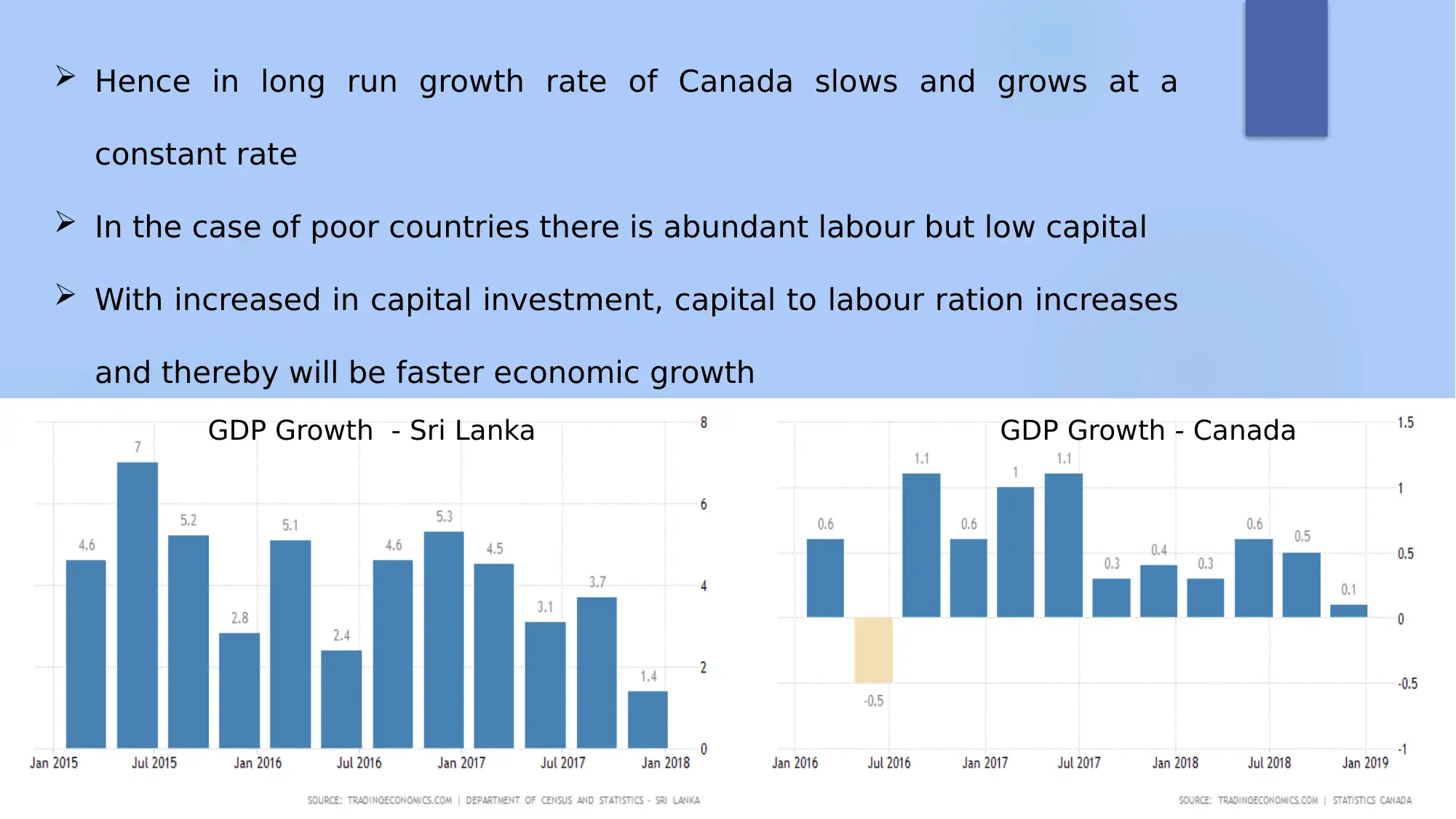
Hence in long run growth rate of Canada slows and grows at a
constant rate
In the case of poor countries there is abundant labour but low capital
With increased in capital investment, capital to labour ration increases
and thereby will be faster economic growth
Poor economies grows faster than rich economies
GDP Growth - Sri Lanka GDP Growth - Canada
constant rate
In the case of poor countries there is abundant labour but low capital
With increased in capital investment, capital to labour ration increases
and thereby will be faster economic growth
Poor economies grows faster than rich economies
GDP Growth - Sri Lanka GDP Growth - Canada
Paraphrase This Document
Need a fresh take? Get an instant paraphrase of this document with our AI Paraphraser
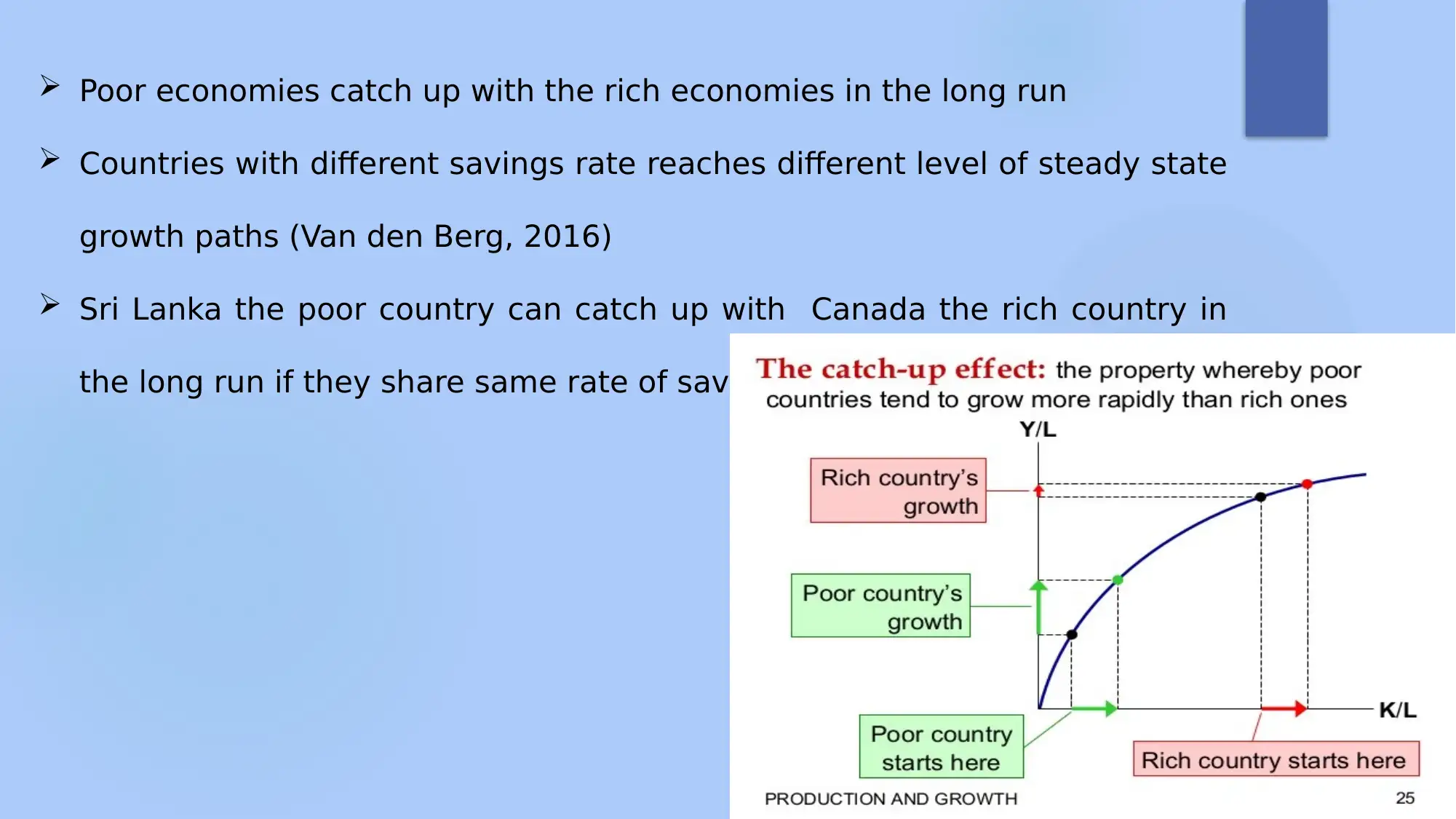
Poor economies catch up with the rich economies in the long run
Countries with different savings rate reaches different level of steady state
growth paths (Van den Berg, 2016)
Sri Lanka the poor country can catch up with Canada the rich country in
the long run if they share same rate of savings
Countries with different savings rate reaches different level of steady state
growth paths (Van den Berg, 2016)
Sri Lanka the poor country can catch up with Canada the rich country in
the long run if they share same rate of savings
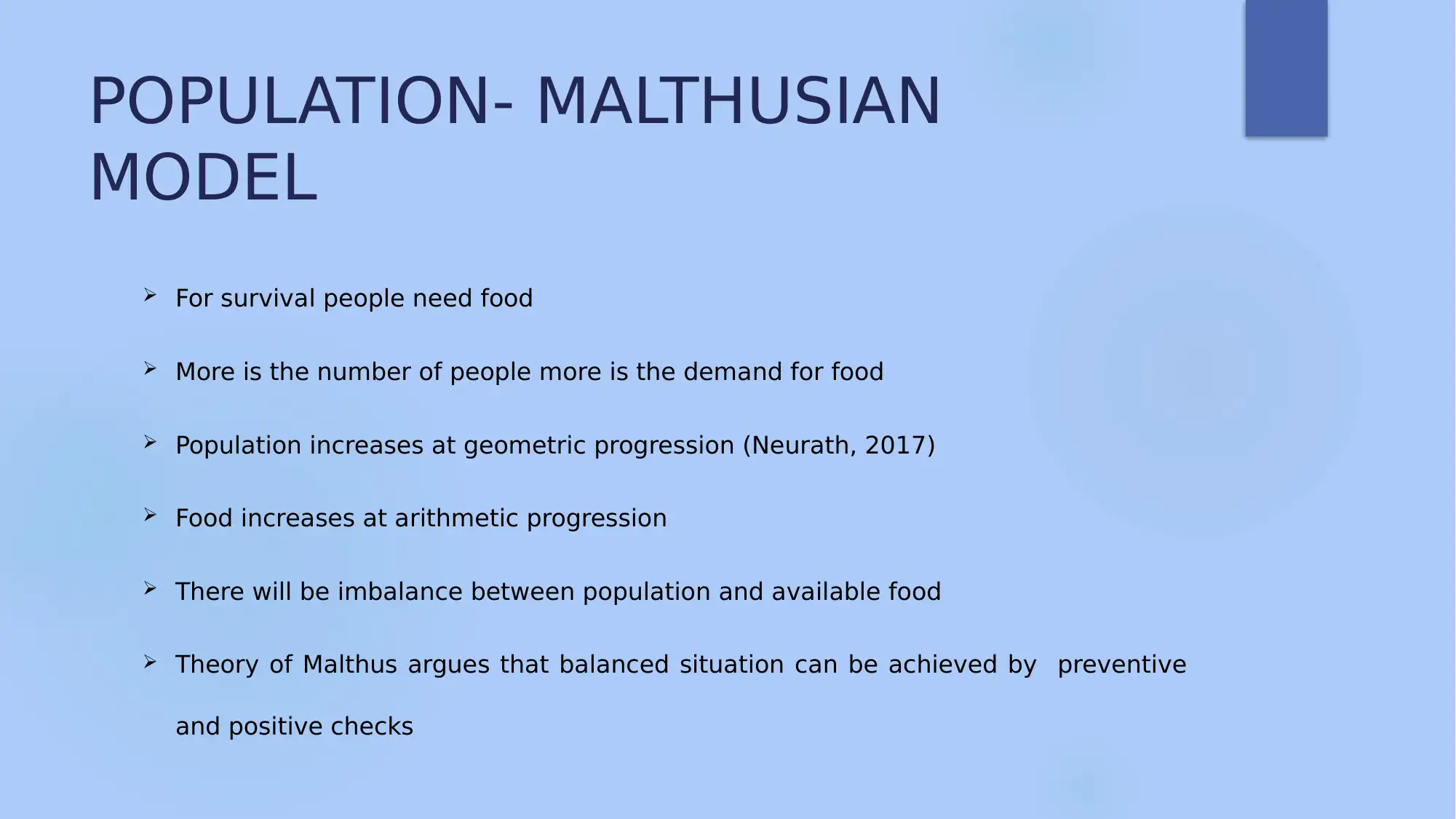
POPULATION- MALTHUSIAN
MODEL
For survival people need food
More is the number of people more is the demand for food
Population increases at geometric progression (Neurath, 2017)
Food increases at arithmetic progression
There will be imbalance between population and available food
Theory of Malthus argues that balanced situation can be achieved by preventive
and positive checks
MODEL
For survival people need food
More is the number of people more is the demand for food
Population increases at geometric progression (Neurath, 2017)
Food increases at arithmetic progression
There will be imbalance between population and available food
Theory of Malthus argues that balanced situation can be achieved by preventive
and positive checks
⊘ This is a preview!⊘
Do you want full access?
Subscribe today to unlock all pages.

Trusted by 1+ million students worldwide
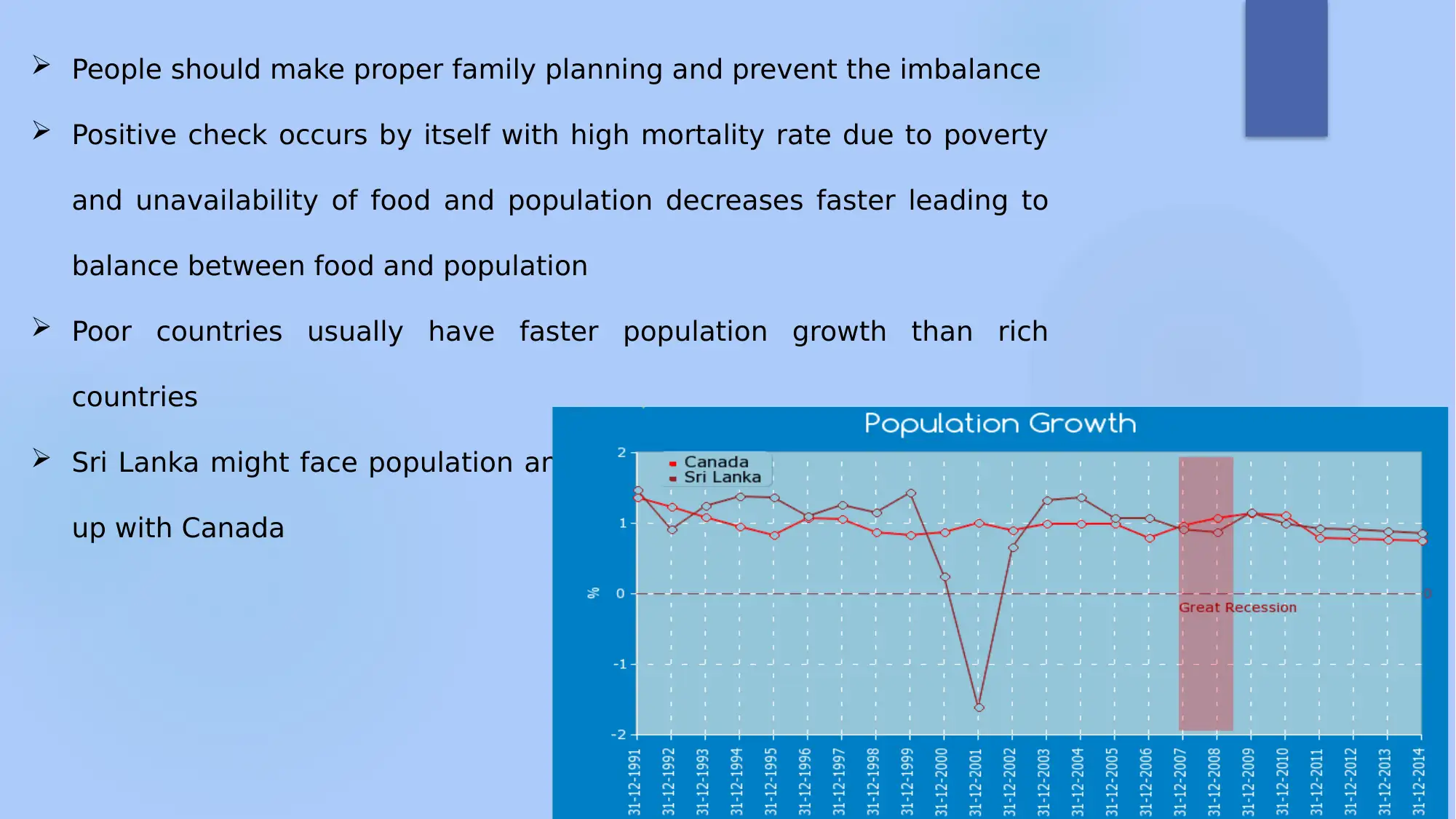
People should make proper family planning and prevent the imbalance
Positive check occurs by itself with high mortality rate due to poverty
and unavailability of food and population decreases faster leading to
balance between food and population
Poor countries usually have faster population growth than rich
countries
Sri Lanka might face population and food imbalance and fails to catch
up with Canada
Positive check occurs by itself with high mortality rate due to poverty
and unavailability of food and population decreases faster leading to
balance between food and population
Poor countries usually have faster population growth than rich
countries
Sri Lanka might face population and food imbalance and fails to catch
up with Canada
Paraphrase This Document
Need a fresh take? Get an instant paraphrase of this document with our AI Paraphraser
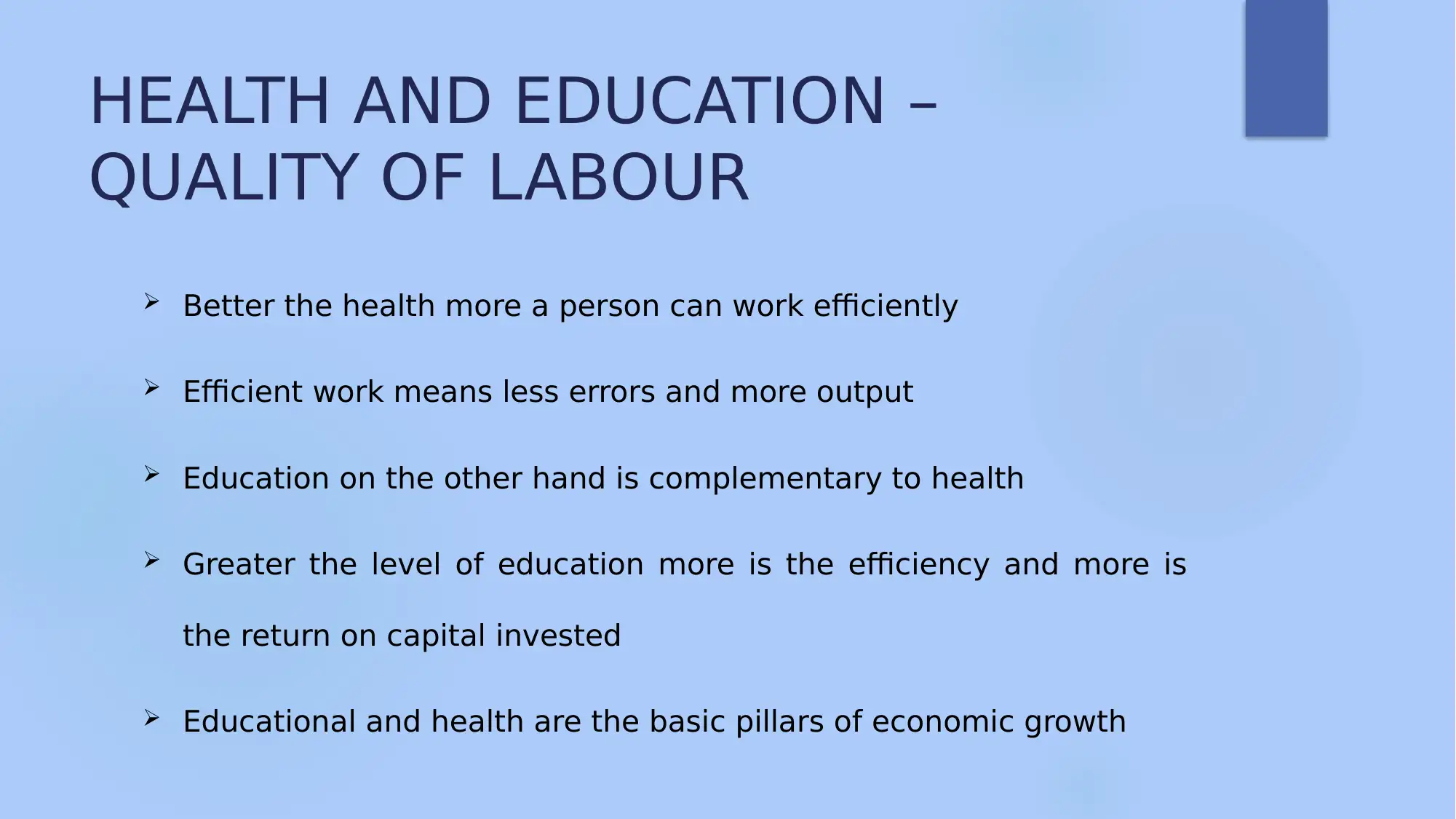
HEALTH AND EDUCATION –
QUALITY OF LABOUR
Better the health more a person can work efficiently
Efficient work means less errors and more output
Education on the other hand is complementary to health
Greater the level of education more is the efficiency and more is
the return on capital invested
Educational and health are the basic pillars of economic growth
QUALITY OF LABOUR
Better the health more a person can work efficiently
Efficient work means less errors and more output
Education on the other hand is complementary to health
Greater the level of education more is the efficiency and more is
the return on capital invested
Educational and health are the basic pillars of economic growth
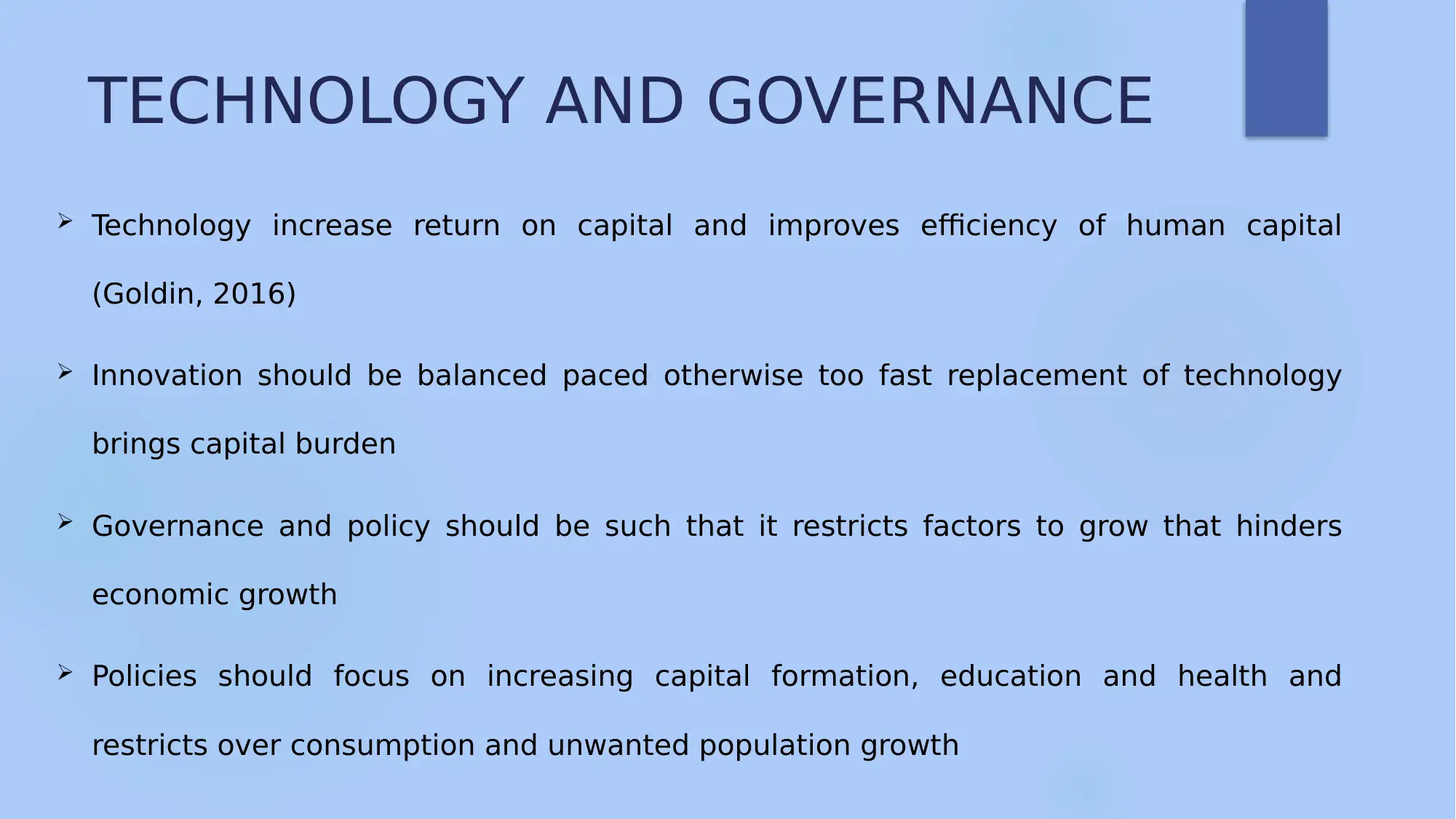
TECHNOLOGY AND GOVERNANCE
Technology increase return on capital and improves efficiency of human capital
(Goldin, 2016)
Innovation should be balanced paced otherwise too fast replacement of technology
brings capital burden
Governance and policy should be such that it restricts factors to grow that hinders
economic growth
Policies should focus on increasing capital formation, education and health and
restricts over consumption and unwanted population growth
Technology increase return on capital and improves efficiency of human capital
(Goldin, 2016)
Innovation should be balanced paced otherwise too fast replacement of technology
brings capital burden
Governance and policy should be such that it restricts factors to grow that hinders
economic growth
Policies should focus on increasing capital formation, education and health and
restricts over consumption and unwanted population growth
⊘ This is a preview!⊘
Do you want full access?
Subscribe today to unlock all pages.

Trusted by 1+ million students worldwide
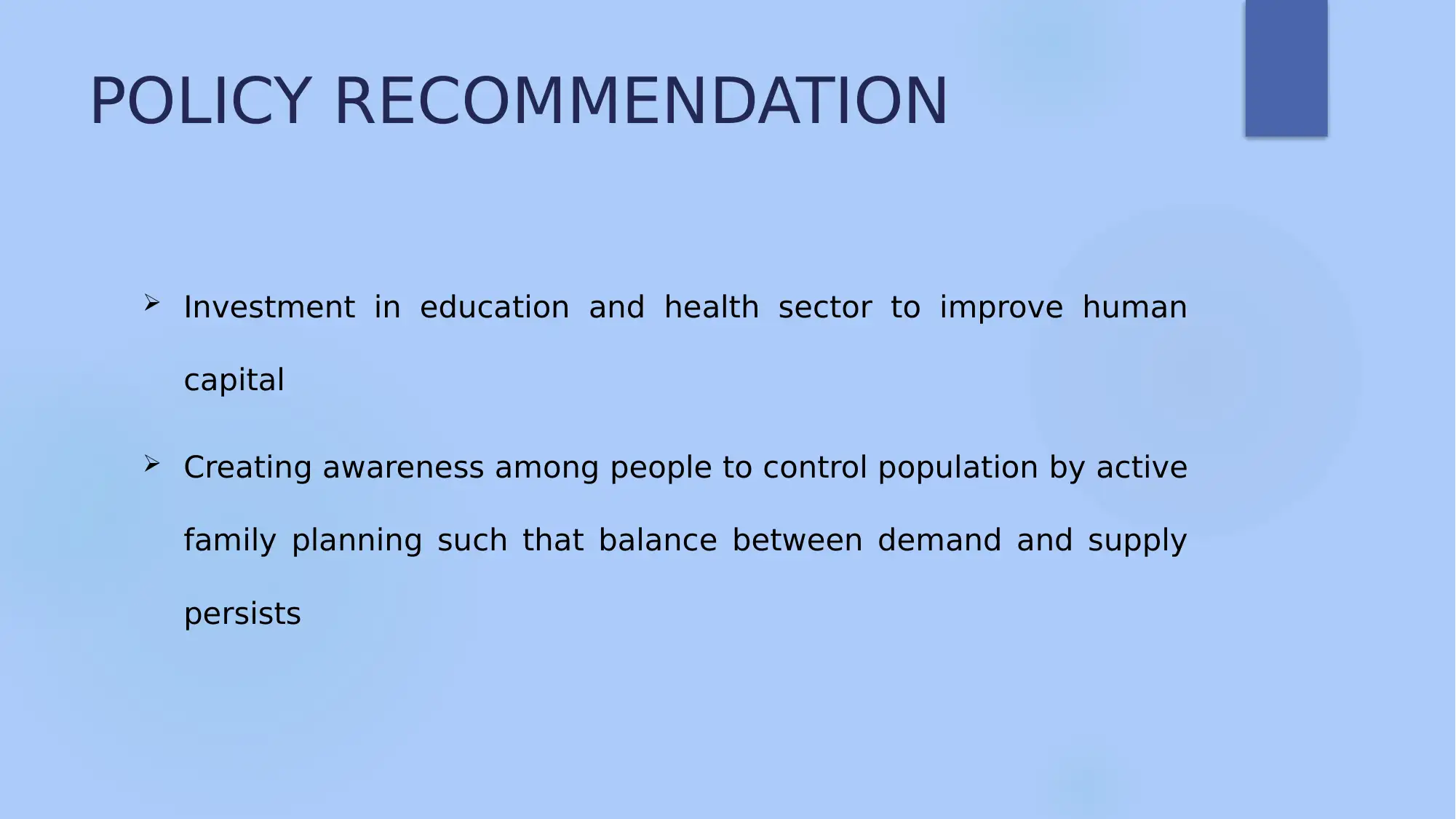
POLICY RECOMMENDATION
Investment in education and health sector to improve human
capital
Creating awareness among people to control population by active
family planning such that balance between demand and supply
persists
Investment in education and health sector to improve human
capital
Creating awareness among people to control population by active
family planning such that balance between demand and supply
persists
Paraphrase This Document
Need a fresh take? Get an instant paraphrase of this document with our AI Paraphraser
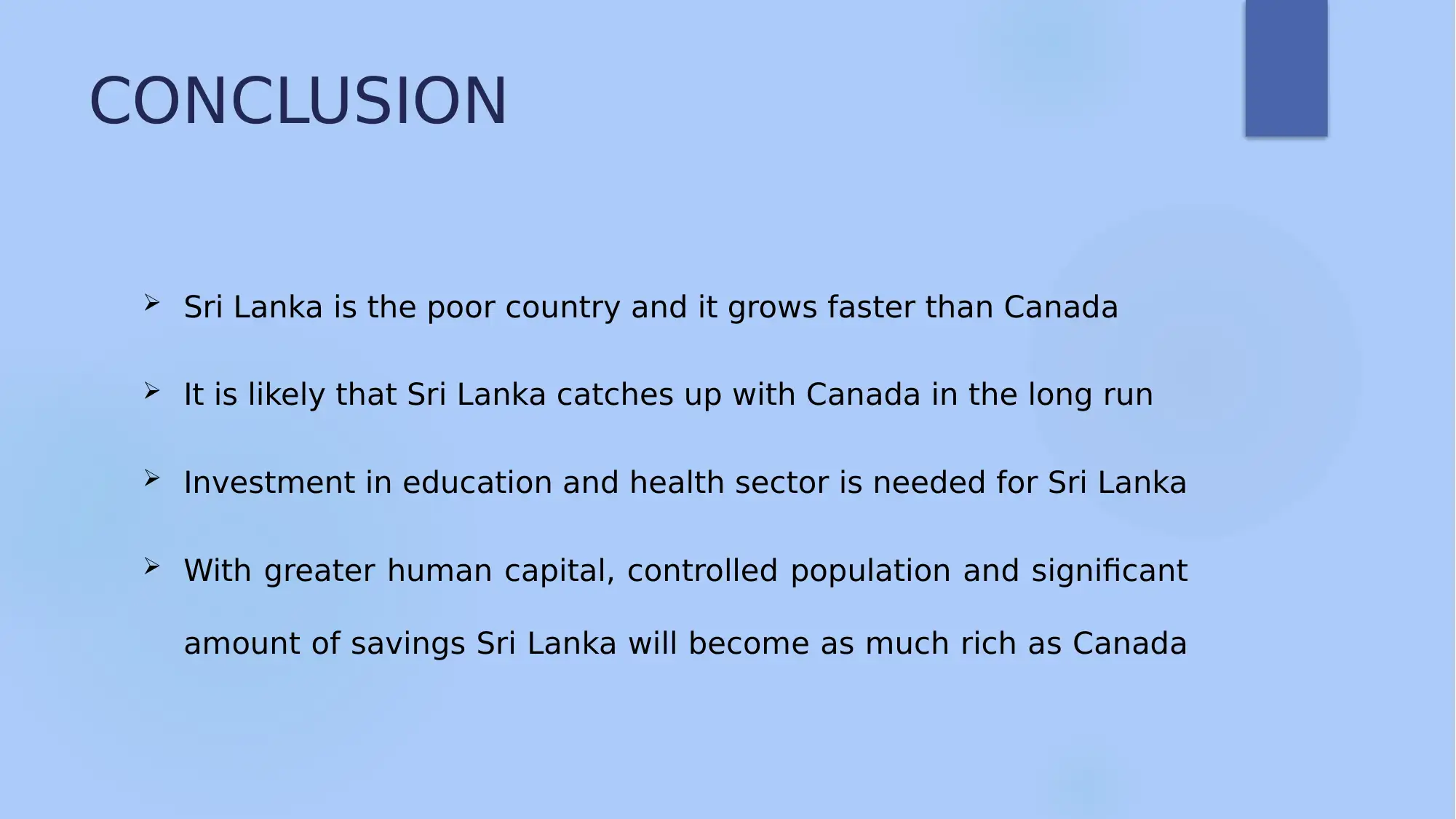
CONCLUSION
Sri Lanka is the poor country and it grows faster than Canada
It is likely that Sri Lanka catches up with Canada in the long run
Investment in education and health sector is needed for Sri Lanka
With greater human capital, controlled population and significant
amount of savings Sri Lanka will become as much rich as Canada
Sri Lanka is the poor country and it grows faster than Canada
It is likely that Sri Lanka catches up with Canada in the long run
Investment in education and health sector is needed for Sri Lanka
With greater human capital, controlled population and significant
amount of savings Sri Lanka will become as much rich as Canada
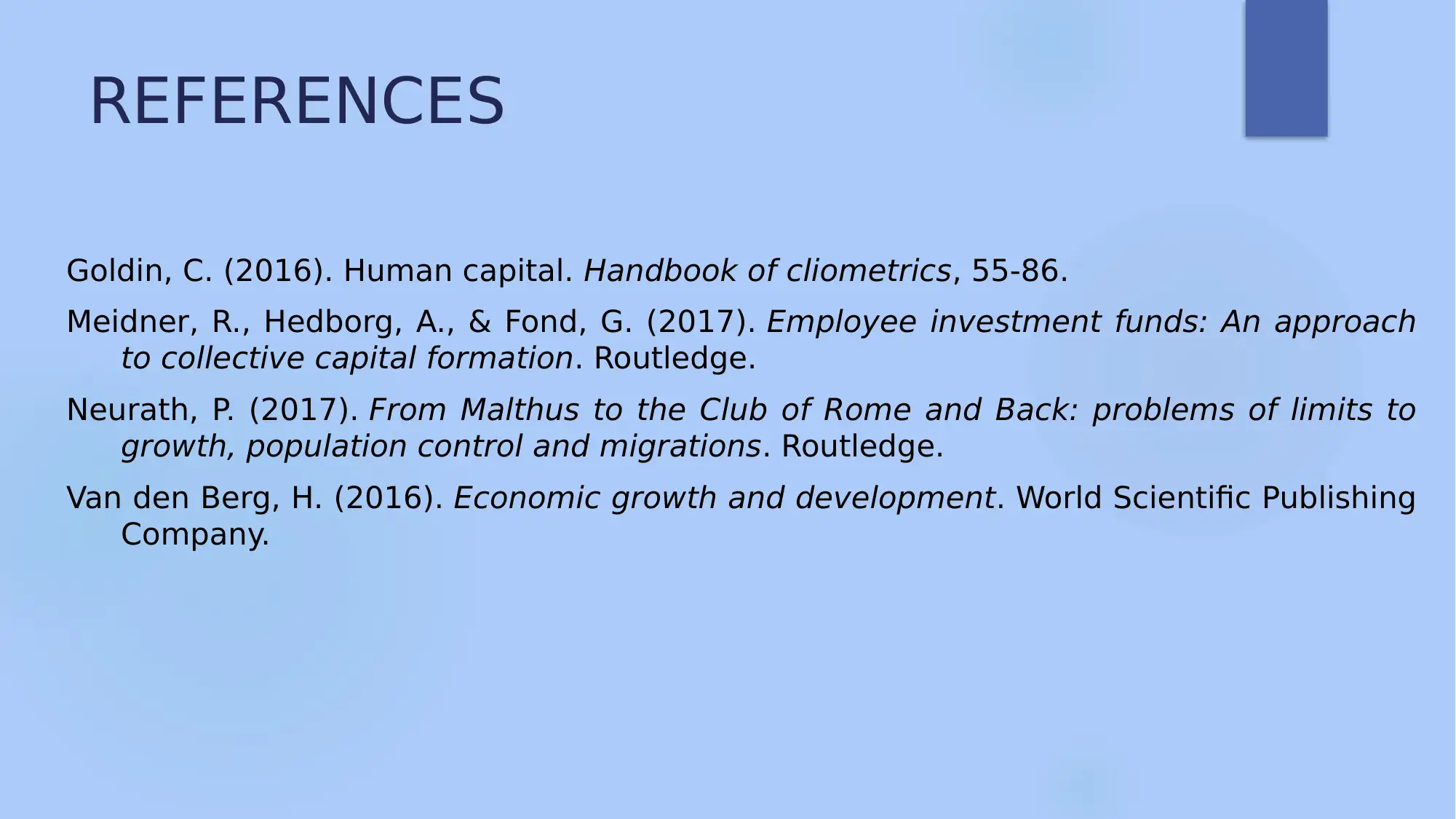
REFERENCES
Goldin, C. (2016). Human capital. Handbook of cliometrics, 55-86.
Meidner, R., Hedborg, A., & Fond, G. (2017). Employee investment funds: An approach
to collective capital formation. Routledge.
Neurath, P. (2017). From Malthus to the Club of Rome and Back: problems of limits to
growth, population control and migrations. Routledge.
Van den Berg, H. (2016). Economic growth and development. World Scientific Publishing
Company.
Goldin, C. (2016). Human capital. Handbook of cliometrics, 55-86.
Meidner, R., Hedborg, A., & Fond, G. (2017). Employee investment funds: An approach
to collective capital formation. Routledge.
Neurath, P. (2017). From Malthus to the Club of Rome and Back: problems of limits to
growth, population control and migrations. Routledge.
Van den Berg, H. (2016). Economic growth and development. World Scientific Publishing
Company.
⊘ This is a preview!⊘
Do you want full access?
Subscribe today to unlock all pages.

Trusted by 1+ million students worldwide
1 out of 12
Related Documents
Your All-in-One AI-Powered Toolkit for Academic Success.
+13062052269
info@desklib.com
Available 24*7 on WhatsApp / Email
![[object Object]](/_next/static/media/star-bottom.7253800d.svg)
Unlock your academic potential
Copyright © 2020–2026 A2Z Services. All Rights Reserved. Developed and managed by ZUCOL.





